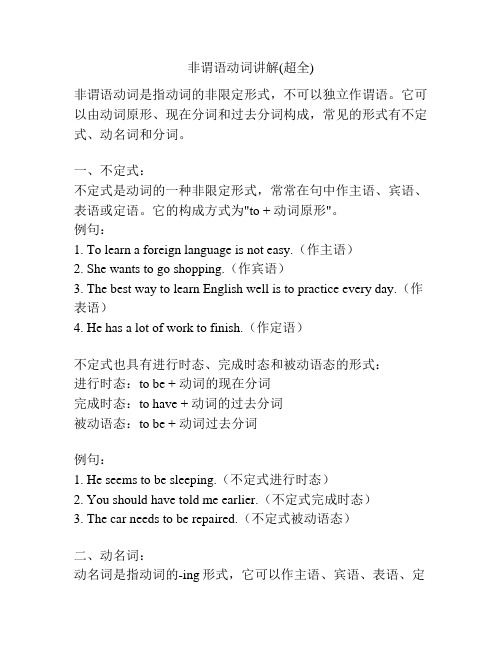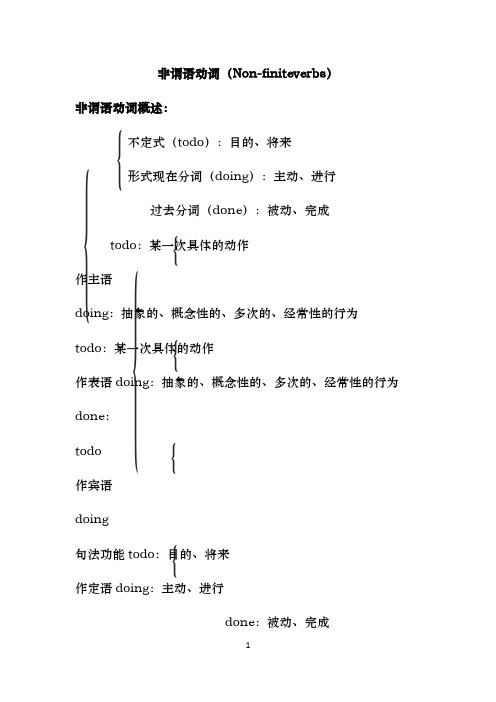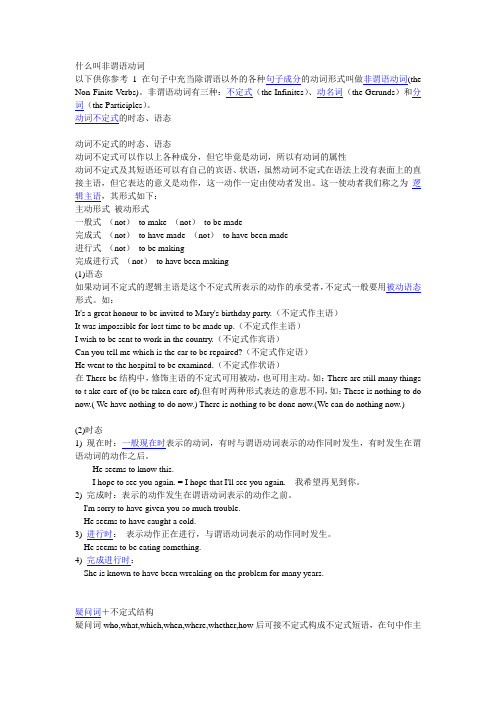非谓语动词
非谓语动词讲解(超全)

非谓语动词讲解(超全)非谓语动词是指动词的非限定形式,不可以独立作谓语。
它可以由动词原形、现在分词和过去分词构成,常见的形式有不定式、动名词和分词。
一、不定式:不定式是动词的一种非限定形式,常常在句中作主语、宾语、表语或定语。
它的构成方式为"to + 动词原形"。
例句:1. To learn a foreign language is not easy.(作主语)2. She wants to go shopping.(作宾语)3. The best way to learn English well is to practice every day.(作表语)4. He has a lot of work to finish.(作定语)不定式也具有进行时态、完成时态和被动语态的形式:进行时态:to be + 动词的现在分词完成时态:to have + 动词的过去分词被动语态:to be + 动词过去分词例句:1. He seems to be sleeping.(不定式进行时态)2. You should have told me earlier.(不定式完成时态)3. The car needs to be repaired.(不定式被动语态)二、动名词:动名词是指动词的-ing形式,它可以作主语、宾语、表语、定语或状语。
在句中的位置和用法与名词相似。
例句:1. Reading is my favorite hobby.(作主语)2. I enjoy swimming in the summer.(作宾语)3. Her dream is becoming a famous singer.(作表语)4. The girl standing over there is my sister.(作定语)5. He went to the party without saying goodbye.(作状语)动名词与不定式的区别在于动名词具有进行时态和被动语态,而不定式没有。
非谓语动词(Non-finiteverbs)

非谓语动词(Non-finiteverbs)非谓语动词概述:不定式(todo):目的、将来形式现在分词(doing):主动、进行过去分词(done):被动、完成todo:某一次具体的动作作主语doing:抽象的、概念性的、多次的、经常性的行为todo:某一次具体的动作作表语doing:抽象的、概念性的、多次的、经常性的行为done:todo作宾语doing句法功能todo:目的、将来作定语doing:主动、进行done:被动、完成todo:目的、将来作宾补doing:主动、进行done:被动、完成todo:目的、将来作状语doing:主动、进行done:被动、完成独立成分作状语n./pron.+todo/doing/done独立主格结构with的复合结构GrammarI:非谓语动词的形式(一)过去分词:过去分词只有一种形式,就是一般式done。
①单独表示一个被动的动作;②也可以单独表示动作已经完成;③还可以同时表示被动和完成。
(二)现在分词的各种形式:(三)主动被动用法一般doing beingdone doing的动作与谓语动作几e.g.1._______________(hear)thenews,theycouldn’thelpla ughing.e.g.2.Not________________(finish)thetask,theyhavetostayt hereforanothertwoweeks.e.g.3.________________(turn)offtheTVset,hebegantogoover (复习)hislessons.e.g.4.______________(heat加热),thewatergetshot.e.g.5._______________(build)forhalfayear,thebuildingbeca meourlibrary.e.g.6._______________(tell)manytimes,hestillrepeated(重复)thesamemistake.e.g.7.Isawtherewasaboy________________(blame)byhisfat her.(四)不定式的各种形式(五)e.g.1.Therearemanydishes_________________(wash)inthek itchen.SoIdon’thavetimetoseeafilmwithyoutonight.注意:非谓语动词的否定形式是在其前加notGrammarII:todo、doing作主语或表语一、todo、doing作主语的一般用法:e.g.1.Toswimtodayisagoodideae.g.2.Eatingtoomuchisbad foryourhealth.思考:todo作主语,表__________________________________________________的动作;doing作主语,表_________________________________________________的动作。
什么叫非谓语动词

什么叫非谓语动词以下供你参考 1 在句子中充当除谓语以外的各种句子成分的动词形式叫做非谓语动词(the Non-Finite Verbs)。
非谓语动词有三种:不定式(the Infinites)、动名词(the Gerunds)和分词(the Participles)。
动词不定式的时态、语态动词不定式的时态、语态动词不定式可以作以上各种成分,但它毕竟是动词,所以有动词的属性动词不定式及其短语还可以有自己的宾语、状语,虽然动词不定式在语法上没有表面上的直接主语,但它表达的意义是动作,这一动作一定由使动者发出。
这一使动者我们称之为逻辑主语,其形式如下:主动形式被动形式一般式(not)to make (not)to be made完成式(not)to have made (not)to have been made进行式(not)to be making完成进行式(not)to have been making(1)语态如果动词不定式的逻辑主语是这个不定式所表示的动作的承受者,不定式一般要用被动语态形式。
如:It's a great honour to be invited to Mary's birthday party.(不定式作主语)It was impossible for lost time to be made up.(不定式作主语)I wish to be sent to work in the country.(不定式作宾语)Can you tell me which is the car to be repaired?(不定式作定语)He went to the hospital to be examined.(不定式作状语)在There be结构中,修饰主语的不定式可用被动,也可用主动。
如:There are still many things to t ake care of (to be taken care of).但有时两种形式表达的意思不同,如:These is nothing to do now.( We have nothing to do now.) There is nothing to be done now.(We can do nothing now.)(2)时态1) 现在时:一般现在时表示的动词,有时与谓语动词表示的动作同时发生,有时发生在谓语动词的动作之后。
非谓语动词9种形式

非谓语动词9种形式
1.不定式:to+动词原形,表示目的、原因、结果等。
2. 现在分词:动词+ing,表示主动、进行或描述。
3. 过去分词:动词+ed,表示被动、完成或描述。
4. 动名词:动词+ing,作主语、宾语或介词后的宾语。
5. 分词短语:现在分词或过去分词+其他成分,作状语或定语。
6. 带to的分词短语:to+过去分词,表示被动或完成,作状语或定语。
7. 带having的分词短语:having+过去分词,表示完成,作状语或定语。
8. 带不定式的分词短语:动词+不定式,表示目的、结果、方式,作状语或定语。
9. 带介词的分词短语:动词+介词+现在分词或过去分词,作状语或定语。
- 1 -。
非谓语动词最完整版

非谓语动词一、非谓语动词的概念动词的基本用法是作谓语。
当句中已经有了谓语动词了,要选或要填的动词就只能用非谓语形式了。
二、非谓语形式的三种形式及基本用法:1、动词不定式:to do 表示目的和将来2、动词的ing : doing 表示主动和进行3、动词的过去分词:done 表示被动和完成非谓语动词(一)——动词不定式一、不定式(to do)不定式由“to+动词原形”构成,其否定形式是“not to+动词原形”。
不定式可以带宾语或状语构成不定式短语,没有人称和数的变化,但有时态和语态的变化。
不定式可作主语、宾语、状语、表语和定语,但不能单独作谓语。
不定式运用口诀:本领最多不定式,主,表,宾,补,定和状,样样成分都能干,只有谓语它不敢,大家千万要当心,有时它把句型改,做主宾时用“it”,自己在后把身藏,七个感官三使役,宾补要把to甩开,疑问词后接上它,宾语从句可充当,逻辑主语不定式,不定式前for sb,to前not 是否定,各种用法区别开。
1. I am sorry to ________ you so much trouble. (2008 江苏)A. have givenB. have been givenC. giveD. giving答案:A简析:be sorry to have done sth 意为“已经干了某事而遗憾”,to have done是不定式的完成形式,表示先于谓语动词的动作。
B,被动形式,不合题意。
变式训练:2.The promising young man is said to ______ two novels.A. have writtenB. have been writtenC. writeD. writing (A)2.不定式的句法功能1)作主语:(谓语动词一般用单数)To finish the work in ten minutes is very hard.在十分钟内完成这项工作很难。
英语非谓语三种形式

英语非谓语三种形式
英语非谓语动词有三种形式:动词不定式(to+动词原形)、动名词(动词+ing) 和分词(过去分词、现在分词)。
1、动词不定式:
例句:I want to go to the store. (我想去商店。
)
He asked me to help him with his homework. (他要求我帮他做功课。
)
2、动名词:
例句:Swimming is my favorite sport. (游泳是我最喜欢的运动。
)
I enjoy reading books. (我喜欢读书。
)
3. 分词:
过去分词:
例句:The broken window needs to be fixed. (需要修理这个破窗户。
)
I have finished my homework. (我完成了我的作业。
)
现在分词:
例句:I saw her singing in the choir. (我看到她在合唱团唱歌。
)
The running dog caught the ball. (跑着的狗接住了球。
)。
什么是非谓语动词

什么是非谓语动词在英语语法中,非谓语动词是一类特殊的动词形式,它不具备谓语动词的一些特征,如时态和人称的变化。
非谓语动词包括动词的不定式(infinitive)、动名词(gerund)和分词(participle)。
非谓语动词在句子中可以作为名词、形容词或副词的成分。
1. 不定式(infinitive)不定式是非谓语动词中最常见的形式之一。
它通常由动词的词根形式加上to构成,例如to go、to eat、to learn等。
不定式可以用作名词、形容词或副词。
作为名词时,不定式可以做主语、宾语、表语等。
例如:- To travel is my dream.(去旅行是我的梦想。
)- He wants to buy a new car.(他想买一辆新车。
)作为形容词时,不定式可以修饰名词,并用来表达目的、原因、结果等。
例如:- He needs a book to study.(他需要一本书来学习。
)- I am happy to see you.(我很高兴见到你。
)作为副词时,不定式用来修饰动词、形容词或副词,表示目的、结果、方式等。
例如:- She works hard to succeed.(她努力工作以获得成功。
)- He walked slowly to avoid falling.(他慢慢地走以避免摔倒。
)2. 动名词(gerund)动名词是动词的-ing形式,它可以作为一个名词在句子中使用。
与不定式不同,动名词可以作为主语、宾语、表语、介词宾语等。
例如:- Swimming is good exercise.(游泳是一项好的锻炼。
)- I enjoy singing.(我喜欢唱歌。
)动名词也可以与一些特定的动词或动词短语搭配使用,这些短语通常以动名词作为宾语。
例如:- He admitted stealing the money.(他承认偷了钱。
)- She can't help laughing.(她禁不住笑。
非谓语动词讲解(超全

非谓语动词讲解(超全非谓语动词是指动词的非谓语形式,包括动词不定式、动名词和现在分词。
与主谓结构不同,非谓语动词可在句子中作状语、定语或表语。
在英语中,非谓语动词的形式是相对固定的,但在不同的语法环境中所表示的意义和用法有所差异。
1. 动词不定式(to-infinitive)动词不定式由“to + 动词原形”构成,常常用作动词的宾语、主语、状语或定语。
例如:- 宾语:I want to go to the zoo.(我想去动物园。
)- 主语:To speak English fluently is important for your career.(流利地说英语对你的事业很重要。
)- 状语:He went to the store to buy some groceries.(他去商店买了些杂货。
)- 定语:She needs a pen to write her essay.(她需要一支笔来写作文。
)2. 动名词(gerund)动名词是将动词加上-ing构成,常常用作动词的宾语、主语、状语或定语。
例如:- 宾语:I enjoy reading books in my spare time.(我闲暇时喜欢读书。
)- 主语:Swimming is good exercise.(游泳是很好的锻炼。
)- 状语:She left the party early, feeling tired.(她因为感觉累了,所以提前离开了聚会。
)- 定语:The crying baby woke up the whole neighborhood.(哭闹的婴儿把整个邻居都吵醒了。
)3. 现在分词(present participle)现在分词由动词原形加上-ing构成,常常用作动词的宾语、主语、状语或定语。
例如:- 宾语:He enjoys playing soccer on weekends.(他喜欢周末踢足球。
)- 主语:Listening to music helps me relax.(听音乐帮助我放松。
- 1、下载文档前请自行甄别文档内容的完整性,平台不提供额外的编辑、内容补充、找答案等附加服务。
- 2、"仅部分预览"的文档,不可在线预览部分如存在完整性等问题,可反馈申请退款(可完整预览的文档不适用该条件!)。
- 3、如文档侵犯您的权益,请联系客服反馈,我们会尽快为您处理(人工客服工作时间:9:00-18:30)。
1.There is still a long way to go to work out all the problems______conservation of naturalresources.A.concerning B.concerned C.to concern D.concern2.The missionary,______as a Chinese,pretended to be a local,but his blue eyes and Greeknose______him______.A.dressing,gave,out B.dressed,gave,awayC.being dressed,gave,outD.dressing,gave,away3.Professor Black has been working in the forest for years,_____to the research of wild plantsand animals. A.devoted B.devoting C.to devote D.and devote4.He ______on the bench,with his head down and his eyes ______on the ground.A.was seated,fixingB.was seated,fixedC.seated,fixingD.seating,fixed5. Mrs.White showed her students some old maps______from the library.A.to borrowB.to be borrowedC.borrowedD.borrowing6.I had great difficulty _________the suitable food on the menu in that restaurant.A.findB.foundC.to findD.finding7.I’m calling to enquire about the position_____in yesterday’s China Daily.A.advertisedB.to be advertisedC.advertisingD.having advertised8.The silence of the library is sometimes broken by a sudden cough or the sound of pages_____.A.turningB.turnedC.being turnedD.having turned9._______in the sports world,a sportsman needs to train constantly to keep himself in best condition.A.SurviveB.SurvivingC.To surviveD.Survived10.As a Senior Three student,we are supposed to know how we should adjust ourselves to ______ Sure we are in the proper mental state.A.makeB.makingC.madeD.be made11.---What made Susan so angry?---_______in the rain for a long time.A.Being kept waitingB.Being kept to waitC.Because of waitingD.She was kept waiting12.Jack offered us a big meal when he was leaving the office,but our work _____,we refused the offer.A.not finished B.had not been finished c.not having finished D.wasn’t finished 13.---Can you hand in your composition tomorrow?---Sure._____it handed in on time,I’ll stay up tonight. A.To have got B.Having got C.Getting D.To get14._____in the countryside,though living in town,he _____his home village all the time.A.Brought up,has still thought ofB.Being brought up,is still thinking ofC.Having been brought up.still thinks ofD.Brough up,is still thinking of15.Something must be wrong with this machine,and it needs ______without delay.A.repairedB.to repairC.repairingD.being repaired16.The local government is trying all out to find out who is ____the forest fire.A.to blame for startingB.to blame to start c.to be blamed for starting D.to be blamed to start17.---Is Bob still working in your school?---I’m afraid not.He is said_____and ____in a private school recently. A.to resign,to teach B.to have resigned,teachingC.having resigned,to be teachingD.to have resigned,to be teaching18.The young man,___several attempts to beat the world record in high jumping,decided to have another try.A.to make B.making C.made D.having made19.It is tim,my best friend in my childhood,who tells me he always dreams of_____for him to go to Shanghai and study and live there.A.there to be a chanceB.there is a chanceC.there being a chanceD.being a chance20.We are invited to a party ____in our club next Friday.A.to be heldB.heldC.being held Dholding21.______,you need to give all you have and try your best.A.Being a winnerB.To be a winnerC.Be a winnerD.Having been a winner22.He told us whether_____a picnic was still under discussion.A.to haveB.havingC.haveD.had23Tom is waiting __________ the doctor.A. to seeB. for to seeC. for seeingD. for see24. I went to see him __________ him out.A. findingB. findC. only to findD. only found25. _________, one needs much practice.A. To learn swimming wellB. To learn to swim wellC. Swimming to be learned wellD. Learning swim well26. __________, I don’t like her sister.A. Telling the truthB. Been told the truthC. To tell the truthD. To tell the true27. __________ for several weeks, the city was short of food and clothing.A. As having floodedB. As floodingC. Having been floodedD. to flood28. __________ tomorrow’s lessons, I have no time to go out with you.A. Not preparingB. Not prepareC. Not being preparedD. Not having prepared29. _________ from the tallest building, the whole city looks very beautiful..A. SeeB. SawC. SeeingD. Seen30. Look around when ___________ the street.A. acrossB. crossingC. crossedD. to be crossing31. We walked as fast as we could, __________ to catch the 9:30 train.A. hopingB. to hopeC. we hopedD. being hoped32. ___________ the past, our life is much better.A. Comparing withB. Be compared withC. To compare withD. Compared with33. __________ the cry for help, people immediately rushed out of the rooms.A. To hearB. HearingC. Having heardD. They hearing34. It __________ heavily, the outing had to be put off.A. being rainedB. being rainingC. rainingD. rains35. The sun __________, they went home.A. set downB. settedC. settingD. sets36. __________ the concert began.A. The listeners having taken their seatsB. Having taken their seatsC. Have taken their placesD. The listeners to have taken their places37. __________ Hello, he reached out his hand.A. SaidB. SayingC. Talked aboutD. Talking to38. He rushed into the room, __________.A. with sweat drippingB. sweat drippedC. dripped sweatD. sweated39. __________, I went out for a walk.A. There was nothing to doB. There being nothing to doC. There had nothing to doD. There were nothing to do40.speak to him kindly _________ him.A. to not frightenB. so as not to frightenC. in order to not frightenD. for not frighteningABABC DACCA AADDC ADDCA BA ACB CCDDB ADBCC ABABB。
